It takes a community that supports Women into Leadership Positions – Ugochi Oluigbo
Ugochi Oluigbo, is a passionate freelance environmental journalist recognised for her creative storytelling, insightful interviews, and engaging content around climate on TV and online. For Oluigbo, motherhood is a defining moment in a woman’s career trajectory. To excel and crash the glass ceiling, she explains women need all the support they can overcome imposed barriers to advance in their career. It takes a community of friends, familiar environment, spousal support, a great network of colleages and circle of influence she says to succeed, especially during the phase of early motherhood and parenthood.
Now learning French as her new language living in France, Oluigbo takes us on her remarkable journey in the media and the stories behind her many awards. One of the insights she shared with us is to always remember to draw the line between volunteerism and charging a fee as a financial changing mindset for more financial independence and success.
Grab a seat, pour some cool water into a glass and enjoy this special series of Women in Media Leadership Policy Drive supported by Wole Soyinka Centre for Investigative Journalism, #ReportWomen and Gates Foundation.
If you were to flash back in time, when would you say was the first time you knew journalism was going to be a passion for you?
Thanks so much for this opportunity, Ejiro. I think I have always loved watching the news, NTA news back then, and I remember trying to read like them and copy them. So, I thought of being a news anchor early in life. That was it, I just thought about it to practice, but I never had real opportunity until I entered the university. It was in my second year I met a coursemate, Chinyere Ukaegbu, who was also working for a radio station at that time, and I quite admired her. I spoke to her and told her that I would love to try out presenting on the radio, and she said “Okay, I will talk to them maybe you can come for an interview”, and that was how I started presenting on the radio.
In my third year, at Imo State University, I started hosting shows, music shows, so I started as a DJ.
When was the turning point for you in your career when you realised journalism was no longer a job you showed up to?
I will say when I discovered the environment of journalism. I have the passion, I have the voice; everyone told me that. That was 2009, I think. I was in Abuja then an intern newbie, I started hosting shows, music shows, so I started as a DJ. Late Esther Obong Egbuna was my boss and Topgun -Kingsley Ihegboro taught me to host almost perfect shows, every show. None was to be below the bar. Internews became popular then, and a lot of journalists and a lot of journalists went there to get training. I didn’t quite like reporting on HIV, but I knew there was something inside of me, but didn’t know which beat I would go to do that. Then I stared hearing about climate change and I realised this is what I wanted to do. This thing became a passion for me, so I started a radio show. I had friends who were covering HIV but I did not want to do that. My father has also raised us to love animals and plants, and all of that laid the foundation for me. I will say that was the moment I realised that it was not just a job but a passion for me. It became my life.
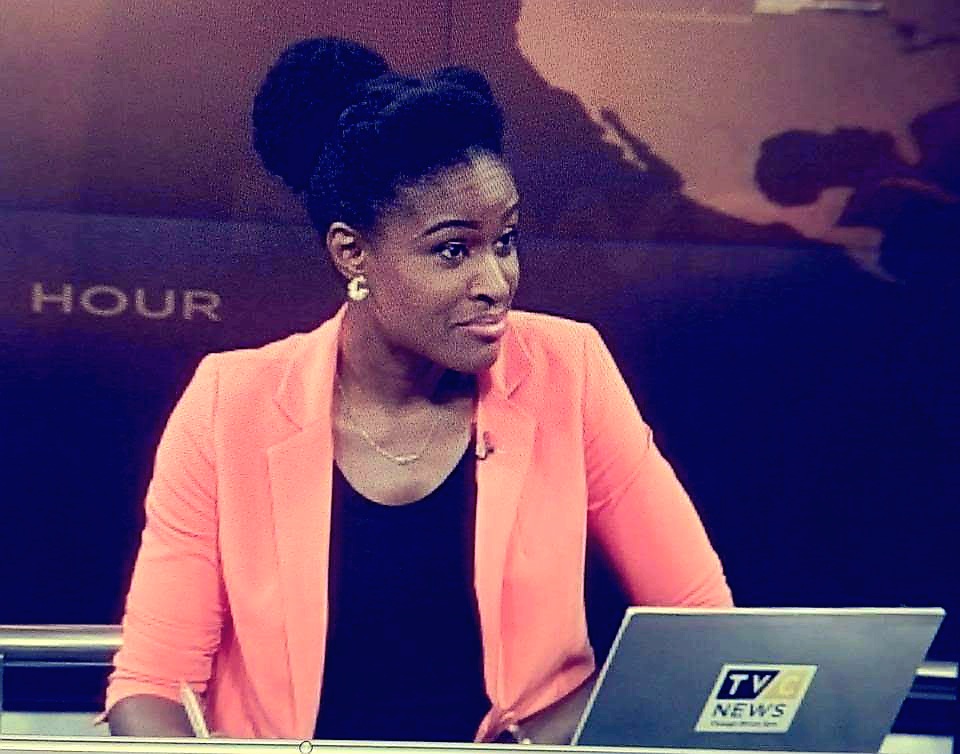
Ugochi Oluigbo: casting news on TV was a childhood dream come true. PC: Oluigbo.
As a mother, it is not very easy to handle motherhood and career. I used to travel a lot. It became at some point, quite challenging, to either travel with my baby or leave my baby behind. Then it became babies. As a mother, it has been quite challenging. I see my colleagues, especially those who are male, I see that they have gone far, but I am grateful for where I am. I’m grateful for the experiences.
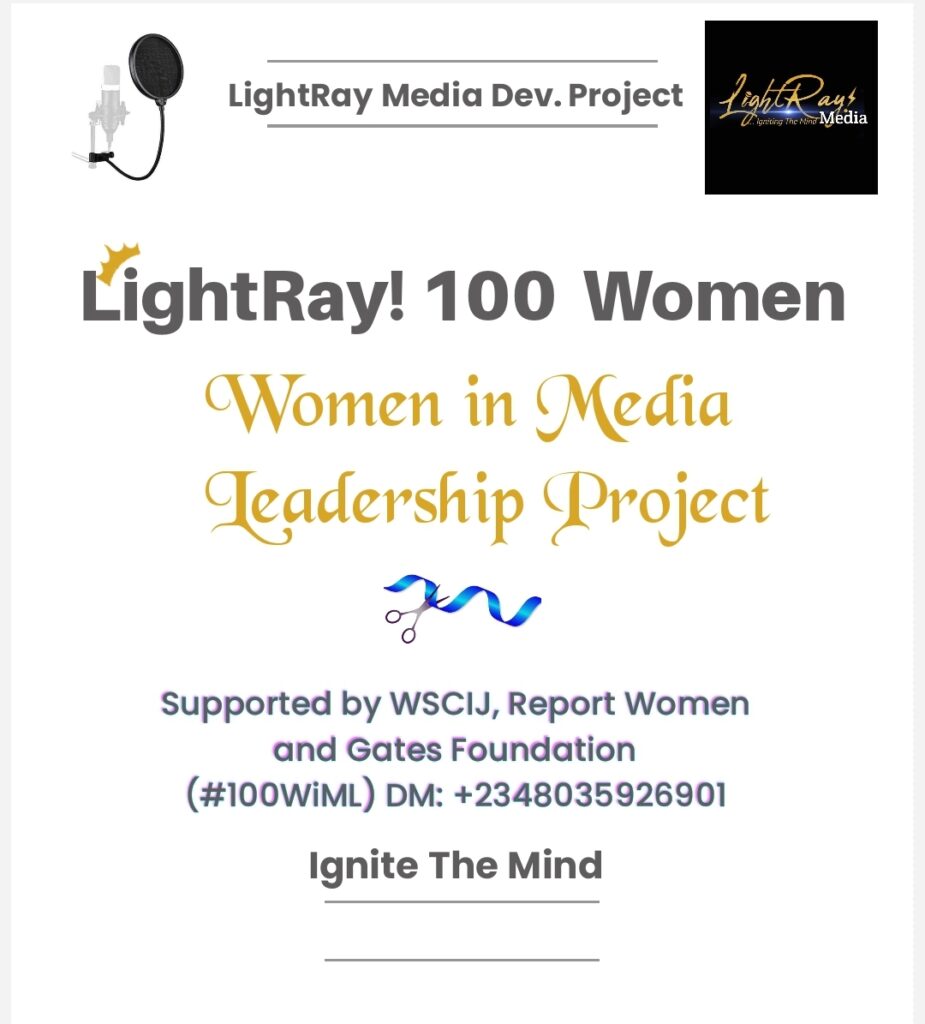
Any past struggles or current struggles during your career you have had to overcome or teying to overcome?
I will say the current struggle is being a mother. As a mother, it is not very easy to handle motherhood and career. I used to travel a lot. It became at some point, quite challenging, to either travel with my baby or leave my baby behind. Then it became babies. As a mother, it has been quite challenging. I see my colleagues, especially those who are male, I see that they have gone far, but I am grateful for where I am. I’m grateful for the experiences.
What are some of the barriers you think have prevented you from getting to the career target you have set for yourself?
I will still say motherhood. I think that’s just a challenge for me.
How do you plan to overcome the perculiar challengs motherhood presents? And why is it important for you to overcome them?
Right now, I just have to take it easy. Take my time and do it as I can, step by step. That’s my response about it because I cannot do anything about it. I’m also not living in Nigeria, because in Nigeria, you get a lot of help and support from families. But when you are not in Nigeria, as I now based in France, it is much more difficult, so what I have done is to try to take my children to only go to the canteen, so I could have more time. I have also tried not to do so many things at the same time. It is okay to not have a perfect home or perfect life, it is okay to outsource it, and if you can’t, stop, and start another day. Don’t kill yourself.
What are some of your stories that has been impactful in the course of your career?
The show “Green Angle” has been impactful in the lives of so many of my viewers and fans. A lot of people tell me, “I became very interested in environmental issues, and how to dispose of my waste after I started watching your show”, I also know a lot of people who have also said ” I want to become an environmental journalist, and environmentalist”, just by watching Green Angles. So for me, I have an impact on the lives of people and also tell the stories of the most vulnerable, spending time with those whose stories I have told. I believe that sharing their stories has also brought them a change. I know that when it comes to tangible changes, when it comes to environmental issues, like in Nigeria where you keep reporting the same thing over and over and you don’t quite see a lot of immediate and measurable changes. For example, you are reporting on flooding in Nigeria, and we know preventive measures that will stop the flooding from happening again next year. Then next year, you still have to cover the same flood, the same problem over and over. So, despite all of that, I know that some of those stories have been impactful. And I’m grateful to everyone who let me into their lives to tell their stories.
Of course, I will continue in this line, doing my environmental journalism. Where I am, I’m covering as much of Africa as I can.
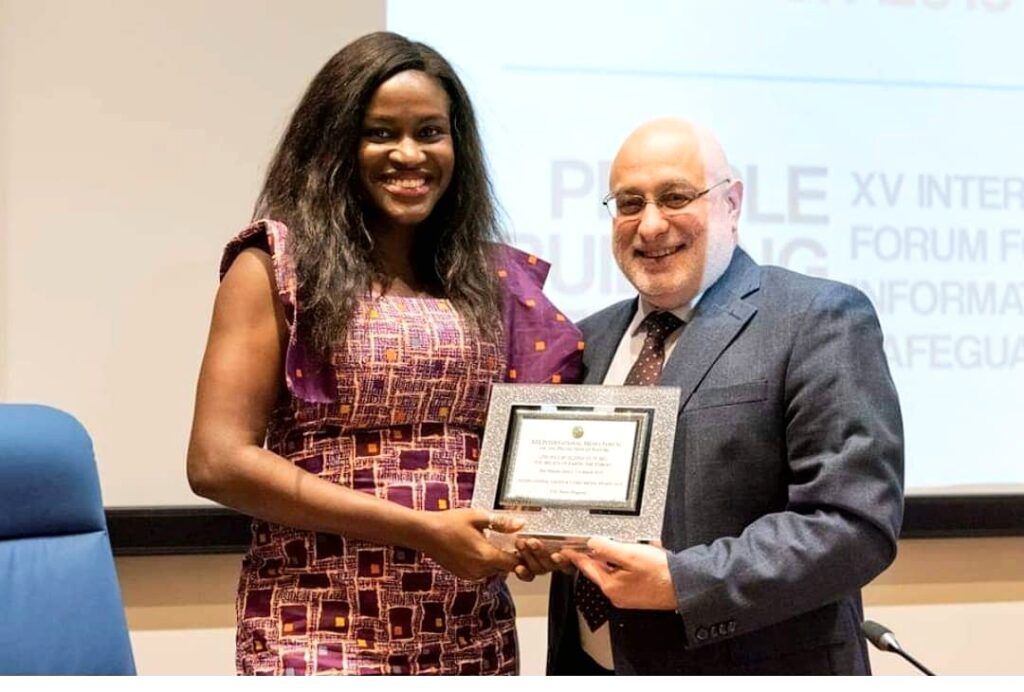
Ugochi Oluigbo receives award plaque for her exceptional climate storytelling investigative report.
It is good to volunteer but after a certain period, you need to ask for money. Think about profits as well. If you have a business in media, you should think of how to create wealth out of it. I regret that I used to do a lot of free jobs, sometimes, it does not work that way. So, when you have opportunities, talk about profits.

What training, programmes, or short courses have you attended, or applied for, and which made the most impact for you?
I won a fellowship to be in Mexico and I worked with an editor, Rachael, who helped me craft one of my best stories. I followed that style, and I have told better stories with that foundation she laid.
The Internews training then, in Abuja, of course, I remembered very well, those trainings with Mr Anselm Okoro, even before I became an environmental journalist. Those were the earlier trainings I got and those made an impact. So I will say the intern news trainings between 2008, 2009.
What suggestions will you give media owners or heads of media business to help boost morale, effectiveness, and reduce toxicity in the workplace?
For me, I think it is to pay salaries, increase salaries. When I tell people that you don’t blame journalists when they have to collect brown envelopes. I’m not saying that it’s okay, I’m not saying it should affect your ability to tell the truth, but I’m saying that some journalists do not have any salary in Nigeria and they are forced to find a means of survival. Media owners should pay salaries, pay better salaries. Appreciate your staff, and support them, it will go a long way in our profession.
If you were to reimagine your career, what would you do differently, starting today?
I will say I had ideas and plans that I never brought up for consideration. Either I dropped them along the way or did it from the start and I wishes I had started or continued. I wished I didn’t procrastinate. I think when I looked back, I used to feel that I was not good at making good use of opportunities or contacts. How I wish I had the opportunity to make better use of the contacts I have made over the years in the industry.
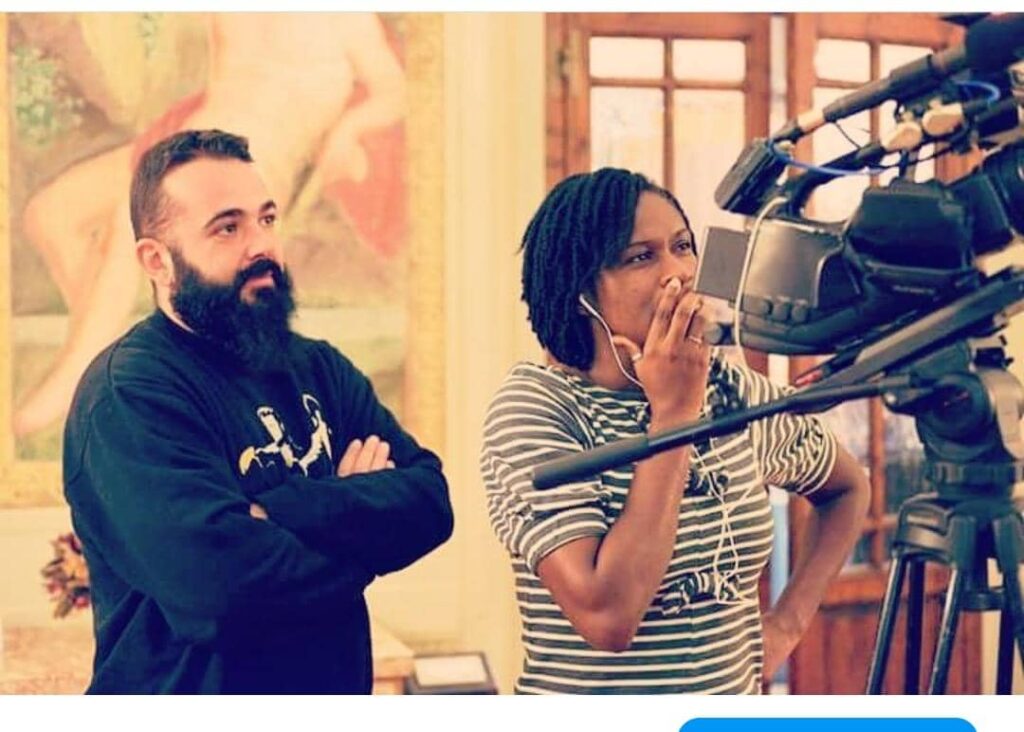
How and what can women in media begin to do differently and better to hold their own space within the media industry?
I think women are doing so well so far, they are doing fantastic. When it comes to the voice, I have always naturally loved the male anchors, reading the news, but when it comes to my work, I have been inspired by so many women. I think our women are doing well despite the challenges that they face, motherhood, for those who are married, and even those who are not married. Despite all of that, they are shattering the glass ceilings. So, I will say that they should continue like this, keep training the younger ones, and keep inspiring them. Keep giving opportunities to females.
Tell us about some of your accomplishments that make you proud of yourself and continue to inspire you to do more?
I will just say all the trips and all the awards that I have won. United Nations Environmental Young Environmental Journalist Award, CCMB Fellowship Award. I will just say all the places I have been to, the people that I have met and all the awards that I have won. United Nations Environmental Young Environmental Journalist Award, CCMP Fellowship Award, UNDP Award, and recently, the Real Green Accors, Italy award, the Covering Climate Award, there are so many. I’m proud of those awards, I’m proud of the stories I have told, I’m proud of the work I have put in, and I’m proud of Green Angle.
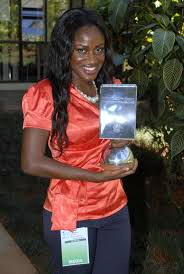
Ugochi Oluigbo: Award recognition for her impactful climate storytelling. PC: Oluigbo.
I have also tried not to do so many things at the same time. It is okay to not have a perfect home or perfect life, it is okay to outsource it, and if you can’t, stop, and start another day. Don’t kill yourself.

What tips in personal development, career pursuit, network strategies, and wealth creation would you advise other women in media, including men, to tap into?
I will say make and keep connections. It is good to volunteer but after a certain period, you need to ask for money. Think about profits as well. If you have a business in media, you should think of how to create wealth out of it. I regret that I used to do a lot of free jobs, sometimes, it does not work that way. So, when you have opportunities, talk about profits. Think in terms of “This is what I might charge”, and stick to it. And also, try to plan, try to outsource if you can. Try to connect with others in your space. Do things together, and collaborate as much as possible. Balance your personal life.
How do you balance your personal life, work, and family expectations? Which aspects give you the most challenges, and how were you able to overcome them?
It is child care. But what I do is, when they are sleeping or when they are not available, I work as much as I can. Ask for help, if you need help.
Tell us something about the media industry you would like to see a change for the better and why.
It is still the same thing about covering stories and not being biased, not thinking about: “Where does this person come from, who do they represent?” We are Nigerians, we are humans, we are Africans, we are people of the world. Cover stories and tell the truth, with no bias as much as possible. Amplify the voices of those who desperately need help and support.
In the next 3-5 years, where do you see yourself?
In the next five to ten years, I see myself running my own thing, running my enterprise. I see myself being a billionaire (we both laugh. Afterall, there’s nothing wrong with dreaming big! Wink!)

On what Nigeriamedia owners can do differently, Oluigbo has this to say:
Pay salaries, increase salaries. When I tell people that you don’t blame journalists when they have to collect brown envelopes. I’m not saying that it’s okay, I’m not saying it should affect your ability to tell the truth, but I’m saying that some journalists do not have any salary in Nigeria and they are forced to find a means of survival. Media owners should pay salaries, pay better salaries. Appreciate your staff, and support them, it will go a long way in our profession.





Comments